David Colquhoun
An interesting piece about reorganisation, by Richard Layard of LSE, in the Guardian.14 July 2007. Here is a quotation.
One problem with the corporatisation of univerities is that it creates groups that are so large that their heads lose contact with scholarship. There is a perfect example in an advertisement for the Head of the Medical Sciences Division at Oxford. Continue reading
After the fuss about the BBC Alternative Medicine series (see next item), it was good to see the excellent report on the news last night (16th July 2007) about the appearence of the notorious Andrew Wakefield to face charges of professional misconduct. They showed graphs of the increase in
the incidence of measles which has followed the fall in MMR vaccination. They reported on the many studies that have shown no link between MMR and autism. And most fascinatingly, they showed a movie of Wakefield’s speech at the Mind Institute.
Remember that BBC2 series on Alternative Medicine, shown in February 2006?
Given the superb standards of many BBC science programmes, this series was certainly very disappointing, for the reasons, for the reasons listed in detail here. At the time, my own complaints to the BBC got nowhere at all. The series producer came to see me, but remained adamant that the presentation of evidence had been fair.
| Simon Singh’s excellent critiques in the Telegraph and the Guardian got some good publicity, but no retraction from the BBC. On the contrary, a letter was sent to the Guardian, apparently signed by scientists who were involved in making the programme. I discovered that this letter had been written by the BBC itself, and had not even been seen by some of the people whose names appeared at the bottom. | 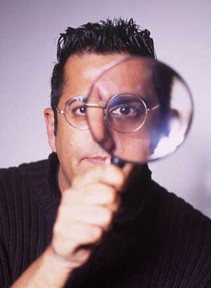 |
Simon Singh also lodged a complaint to the BBC, which was rejected. But he is made of sterner stuff than most people. He appealed, but again the complaint was rejected. Singh then appealed to the highest level (Board of Trustees) and at last the complaint was upheld. At least two of the most serious complaints were upheld.
Singh says
“First, the BBC agreed that the acupuncture open heart surgery sequence “could have misled the audience”. Second, the BBC agreed that their attempts to discredit my criticism of the series “was a breach of trust with the audience” because the BBC had not disclosed its role in organising critical letters.”
This is good news and we should all be grateful to Simon Singh for his persistence. Two of his three serious complaints were upheld, though seven “less serious” ones were not (but should have been).
Read the full judgement of the BBC Trustees.
Let’s hope lessons have been learned.
The Westminster Diet and Health Forum “aims to provide the premier environment where parliamentarians, senior policy advisors, regulators and other decision makers can discuss critical issues, and exchange ideas and information with leaders from industry, responsible interest groups, analysts, academics, journalists and others”.
Their meeting on Thursday 5 July 2007 had the title “Integrating Complementary and Conventional Approaches to Health Care”. Despite some good contributions by Edzard Ernst and Simon Singh, the meeting failed to live up to the aims of the forum, partly because the representatives from the Department of Health failed to turn up (because of the changes following the accession of Gordon Brown), and partly because of the choice of speakers. For a start the audience consisted almost entirely of advocates of various forms of alternative medicine. And the meeting was chaired by David Tredinnick MP (Cons, Bosworth). This is what the BBC News profile says about him.
| David Tredinnick is an old style Conservative MP, being an Eton-educated former Guards officer, who has sat in the Commons since 1987.However, his ambition for high office was thwarted by his role in one of the sleaze stories which helped to sink the Major government.He accepted £1,000 from an undercover reporter to ask parliamentary questions about a fictitious drug.He was obliged to resign from his role as a PPS and was suspended from the Commons for 20 sitting days. He has not sat on the frontbench since.He is an orthodox Conservative loyalist, though he is more supportive of the European Union than many of his colleagues.He has, however, carved himself a niche as the Commons’ most enthusiastic supporter of complementary medicine.He has wearied successive health secretaries with his persistent advocacy of any and all homeopathic remedies.He has also supported their use in prisons and even suggested them as an aid in alleviating the foot and mouth crisis. |
The chairmanship was punctuated by party political speeches, and, more remarkably, by the apparently serious assertion that he was aware of a psychiatric hospital that doubled its staff at full moon (this is an old urban myth, and is, of course, quite untrue). His advocacy of homeopathic borax as a way to control the 2001 epidemic of foot and mouth diease can be read here.
Picture of David Tredinnick MP from the Conservative Party |
 |
Kim Lavely, chief executive of the Prince’s Foundation for Integrated Health (FIH), was chosen as the keynote speaker. She made (several times) the quite remarkable assertion that Prince’s Foundation did not advocate complementary medicine. That’s not quite the impression given by their web site, and I have to say I find the dissimulation of speeches like this hard to take. Just as with her boss, the Prince of Wales, the message seems to be tailored to the audience.Kim Lavely, and Boo Armstrong (of GetWell UK), tried to persuade me that the ‘audit’ of the effects of Pater Hain’s infliction of privatised alternative medicine in Northern Ireland would tell us something useful.Of course it won’t provide any useful information. The efforts of Ben Goldacre to explain to the public what constitutes a trial and what doesn’t have not made much progress here. Edzard Ernst’s request for an example of a treatment that could not be tested in a randomised controlled trial produced no response.
Regulation of complementary medicine is the topic that occupied much of the time. The obvious question is ‘how can one have a professional body for a therapy that doesn’t work?’. This crucial question was consistently ignored. Alternative medicine advocates are mostly desparate to gain respectability by becoming regulated professionals, though only, of course, as along as the regulations do not require them to demonstrate that they can actually benefit patients (see letter to The Times).
The Council for Healthcare Regulatory Excellence (CHRE) is yet another quango. I was unaware of its existence until their “head of Fitness to practice” gave a talk. This organisation gets over £2 million per year of taxpayer’s money. What does it do? Well “CHRE is a statutory overarching body, covering all of the United Kingdom and separate from Government, established from April 2003. It promotes best practice and consistency in the regulation of healthcare professionals by the following nine regulatory bodies”. But these bodies include not only the General Medical Council and the General Dental Council, but also the two forms of alternative medicine that have so far succeeded in getting ‘regulated’ status, the General Chiropractic Council and the General Osteopathic Council (for information on Chiropractic see below and here).
H.L. Mencken (1924) on chiropractic
“This preposterous quackery flourishes lushly in the back reaches of the Republic, and begins to conquer the less civilized folk of the big cities.” (source)
I asked the CHRE representative, Mike Andrews, what would happen if a question of fitness to practice in medicine arose that involved inappropriate use of form of alternative medicine that was also represented by CHRE, but of course I got no answer. Such cases have happened in the UK, for example Dr Marisa Viegas was suspended by the GMC advising a patient to stop heart medication which led to her death. And a Dutch doctor was struck off the register after the death of Sylvia Millecam.
The CHRE seems to be yet another expensive form of ‘box-ticking’ bureaucratic regulation that ends up doing more harm than good. We have become very familiar with such things in universities, where “quality assurance regulators” approve people like Patrick Holford, and pursue policies that end up harming good science, not helping it.
The saga of the excommunication of this page, and its de-excommunication, is described here, and here, and here.
I am supposed to be on holiday, but the Red Lion in Grasmere has a wireless network, and this is just too good not to post at once. So, after a distinctly moist walk over Loughrigg Fell, and an excellent dinner, here goes.

Panorama from half way up Loughrigg Fell, with Grasmere on left and Rydal Water on write, taken just before the downpour started.
 Loughrigg Fell and Rydal Water on left. Grasmere Lake above and Grasmere village (right) with GPS track.
Loughrigg Fell and Rydal Water on left. Grasmere Lake above and Grasmere village (right) with GPS track.
The main trigger for the allegations of defamation seems to have been the fact that I said (and still say), apropos of Dr Ann Walker’s description of red clover, “What on earth is a “blood cleanser” or a “cleanser of the lymphatic system”. This is so much meaningless gobbledygook”.
This set me wondering about the origin of the term “blood cleanser”, and who better to ask than the erudite Micheal Quinion of the wonderful World Wide Words site. His weekly newsletter is invariably fascinating. And buy his books.
Michael Quinion has kindly given permission for me to reproduce his “non-definitive” investigation into the use of the term “blood cleanser”. It seems to have been a favourite of snake oil salesmen in thw 19th century. Of course, none of them defined what it means. You are just meant to know that it’s something good.
Quinion on “Blood Cleanser”“The exact phrase “blood cleanser” is known no later than the nineteenth century. The earliest I’ve found is from an advertisement in the Ohio Democrat for 30 June 1871 (it ran regularly from then on) “D.B. FAHRNEY’S Blood Cleanser or Panacea, for sale by Miller & O’Donnel, is becoming a popular family medicine.” There was also Prof. Chapins’ Blood Cleanser, advertised the following year. But the concept of cleansing the blood is very much older, of course. I have found another advertisement, in the Milwaukee Evening Courier of Wisconsin, dated 22 March 1847: “As a SPRING and FALL PURIFIER it cannot be surpassed, working its way through the system with a silent and effective force,–Cleansing the BLOOD; Removing DYSPEPTIC INFLUENCES; Variations on the phrase also occur several times in Culpeper’s Herbal (1653 edition) in the section on hops: “In cleansing the blood they help to cure the French diseases, and all manner of scabs, itch, and other breakings-out of the body; as also all tetters, ringworms, and spreading sores, the morphew and all discolouring of the skin.” Another example is: “The roots of this Bastard Rhubarb are used in opening and purging diet- #drinks, with other things, to open the liver, and to cleanse and cool the blood.” It also appears earlier still in The Anatomy of Melancholy by Richard Burton (1621): “And because the spleen and blood are often misaffected in melancholy, I may not omit endive, succory, dandelion, fumitory, &c., which cleanse the blood, Scolopendria, cuscuta, ceterache, mugwort, liverwort, ash, tamarisk, genist, maidenhair, &c., which must help and ease the spleen.” No doubt a more thorough search will turn up still earlier examples. (My sources are poor before the eighteenth century.)” |
One of the effects of this affair has been the posting of some critical examinations of some of the writings of Dr Ann Walker. I make no comment. The links are here.
This item appeared originally on the old IMPROBABLE SCIENCE page
The reversal of UCL’s request to remove this page from UCL’s server was, in large part, the result of the power of the blogosphere. Here are some of the things that did the trick.
“Moved to tears by the beauty of blogs”. Goldacre wraps up the affair in the Guardian, and on badscience.net (“Stifling Debate – When Bloggers Attack”).
He gives links to the close examination of the work of Dr Ann Walker that that is now appearing.
“UCL have just issued a smashing statement on Prof Colquhoun’s de-excommunication.” Comment from badscience.
This episode seems to have sparked a close inspection of some of the claims made by Ann Walker. Here are some examples.
“Dr Ann Walker and Her Neanderthal Theories”. An analysis of Walker’s theory about the Neanderthal diet, on the quackometer blog. Goldacre comments
“In one piece, Walker promotes the idea that neanderthals were not a distinct kind of human, but degenerate and malnourished versions of ordinary humans: buy pills or regress to a sub-human state, seems to be Walker’s message. Yikes.”
“Ann Walker festival: “There is no convincing evidence that Ginkgo biloba is efficacious for dementia and cognitive impairment” ” Holfordwatch takes a cool look at more claims by Ann Walker.
“Red Clover comments leave a bitter aftertaste” Click here
“The War Against Gobbledygook” Comment from Astrophysicists.
“UCL Makes good” Comment from the University of Minnesota
University Diaries. A US Professor of English reproduced Ben Goldacre’s first
article.
“Science bloggers unite” Comment from a Yale neurologist.
“The Guardian: a quackbuster . . . “ Comment from MIT (and it’s on the MIT server).
“UCL change tack: Colquhoun is back” The Sceptical Preacher speaks
Freedom of speech and litigious herbalists
Announcement 13 June 2007. UCL restores
DC’s IMPROBABLE SCIENCE page.
After taking legal advice, the provost and I have agreed a joint statememt.
Read it on the UCL web site.
“ . . . the Provost and Professor Colquhoun have taken advice from
a senior defamation Queen’s Counsel, and we are pleased to announce that Professor Colquhoun’s website – with some modifications effected by him on counsel’s advice – will shortly be restored to UCL’s servers.”
I am grateful to UCL for its legal support, and I’m very grateful too for the enormous support I’ve had from many people, especially since Ben Goldacre mentioned the site move. Now all I need is a bit of help to get it into a more convenient format. The page will stay at its present address until there is time to sort things out. For some of the fallout from these events, click here. The name of the page has been changed from quack.html to improbable.html on the advice of lawyers, but the old addresses still work.
Announcement 30 May 2007.
My item about claims made for alleged benefits of the red clover and other herbs has resulted in complaints being made to the provost of UCL (Malcolm Grant), and to Chair of Council (Lord Woolf). The complaints have come from Alan Lakin, husband of Ann Walker. I have received no complaints from them myself.
In the six or years that I have been running this attempt to improve public understanding of science, I am aware of only two serious complaints being made, and as far as I know, this is the first to reach the level of the provost. This one resulted in a request to remove of this page from the UCL server, but that is now reversed.
The Islington Tribune (11 May 2007) revealed that spiritual healers are being paid by the NHS. The National Secular Society commented
“Spiritual healers” using up scarce NHS resourcesThe University College London Hospital is to spend £80,000 on testing whether “spiritual healers” can have an effect on cancer. ” ‘Healers’ who wave their hands over the patient and claim to transmit some kind of undefined ‘energy’ “ want to find out whether their efforts increase the number of white blood cells in cancer sufferers. Astonishingly, UCLH has a dedicated team of 10 “healers”, who cost the hospital around £80,000 a year to maintain. They are the idea of department manager Angela Buxton who first became interested in ‘spiritual healing’ after the death of her seven-year-old son from leukaemia. She told the local paper: “Science has not caught up with how it works. Anecdotal evidence shows it works but we need hard evidence.” |
A defence of this procedure was offered in an email from Martin Lerner (Divisional Manager, Cancer Services)’ He cites cancertherapies.org.uk as saying.
“Today we are also entering the era where appropriate scientific studies of complementary therapy will begin to show specific improvements in outcome for some patients.”
Hang on. Aren’t you meant to get the scientific studies before you start treating patients?
Lerner goes on to say
“UCLH does employ the staff and provide some of the budget (about £90,000 this year) towards the cost of this service, with a similar amount raised through charitable fundraising. By making these complementary therapy services an integral part of the clinical service, we show that we take responsibility for the whole of the patient’s wellbeing, . . .”
Spiritual healing clearly comes under the heading of “dishonest placebo effects”. Nobody is disputing the value to some patients of palliative treatments. The placebo effect can be quite powerful. But is seems the proponents of laying-on-of hands have not considered adequately the lying dilemma
The laying-on-of hands also gives rise to the training dilemma. What does it mean to be “trained”, In something that is essentially mumbo-jumbo?. Well this poses no problem for the box-ticking mentality of the corporate administrator, Just tick the box. Here is the application form. It seems that if you can produce a piece of paper saying you are well-qualified in mumbo-jumbo, then everything is fine.
There is more on the box-ticker mentality elsewhere. It is only too typical of the “efficient administration” that results from corporatisation of the health service, and universities, and the removal of power from those who know what they are talking about.

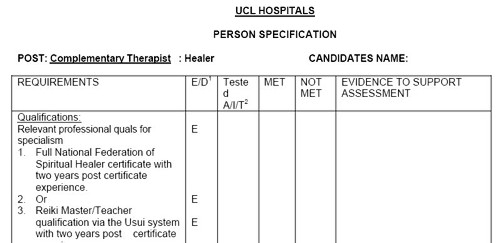
What is the evidence about ‘spiritual healing’ ?
Very little it seems. There is an interesting paper with the title “Psychotherapy and Survival in Cancer: The Conflict Between Hope and Evidence”, by Coyne, Stefanek & Palmer (2007) [download the paper]. They conclude that, despite the popular belief to the contrary, there is little reason to believe that psychotherapy can prolong life in cancer patients. Insofar as complementary treatments are placebos, they count as a form of psychotherapy.
No doubt, mumbo-jumbo can make some people feel better, and to that extent it is justified. But it can and should done be honestly (for example, foot massage is fine, ‘reflexology’ isn’t). Lies to patients should be minimised and universities should not be tempted to hand out certificates in mumbo jumbo.
Postscript
Here is another interesting article on this topic . Attitude doesn’t affect cancer survival. That is based on Optimism and Survival in Lung Carcinoma Patients [download pdf]..
A nice spoof on an obscure variant of laying-on-of-hands.
Read more on the original IMPROBABLE SCIENCE page
Thanks to Ben Goldacre’s Guardian column, and his entry on badsceince.net (http://www.badscience.net/?p=431 ), UCL has come under a lot of pressure (and my hit counter has soared).
Read more on the original IMPROBABLE SCIENCE page
This was posted originally on the old IMPROBABLE SCIENCE page
UCL felled by a herbalist?
OK this isn’t really bad science, but it’s caused inconvenience to me and to readers. It still puzzles me that UCL has not got the resources to deal with a herbalist (the reason that I was given for the move). The herbalist in question, Ann Walker, got rather angry when I called her use of the term ‘blood cleanser’ as gobbledygook
On Friday 1 June, 2007, when it was announced that the IMPROBABLE SCIENCE page had been moved from the UCL server, several people sent letters to the provost. Here is one of them. I have never met Prof Shafer, but his letter, and other similar ones, lightened an otherwise bad day.
| Dear Dr. Grant:I am very sorry to learn that you have requested Dr. Colquhoun to remove his “Improbable Science” web page from the computer system at University College London. It is particularly disheartening to learn that you made this request after receiving a complaint from a practitioner of nonscientific medicine.
I don’t know how many of your faculty publish in Nature (Colquhoun D. Science degrees without the science. Nature. 2007;446:373-4). However, based on my experience at Stanford, I would guess precious few. You now appear to be attempting to squelch his academic freedom, or at least disassociate UCL from his efforts to educate the public about quack science. Perhaps you were put off by the “unprofessional appearance” of the web page. If so then you have misunderstood its purpose. The public is inundated by junk science, A large portion come from the Internet. There are almost no Internet resources where a lay reader can find a counterweight to the extensive claims of pseudoscientists. Dr. Colquhoun’s blog is a unique resource. The format may put off a scientific reader, but it is exactly the format required to get the message to the web surfer with a 10 second attention span. In my view the Improbable Science web page was among the most important public services made available by the University College London. I don’t know the facts of your decision. Perhaps there are policies, procedures, and regulations that Dr. Colquhoun has violated in creating the Improbable Science web page. However, I do know that any request to remove the page that follows a complaint from an individual offended by the page is entirely inappropriate. Even were your request otherwise reasonable, the mere appearance of academic censorship should have been absolutely unacceptable to you. (Think of it like conflict of interest – there is a need to avoid not only true conflict of interest, but the mere appearance of It is thus with shock, sadness, and disappointment that I have learned of this decision by the University College London. I hope that you will reconsider. The present course makes it appear that UCL has caved in to pseudoscientists and is engaged in academic censorship of possibly the most important public service offered by the UCL. Sincerely, Steve Shafer Steven L. Shafer, MD Editor-in-Chief, Anesthesia & Analgesia Professor, Department of Anesthesia, Stanford University Adjunct Professor, Biopharmaceutical Sciences, UCSF Stanford University Medical Center Stanford, CA 94305 |
No doubt it is an exaggeration to say “the Improbable Science web page was among the most important public services made available by the University College London”. But thanks anyway.
After an unrepentant response, Professor Shafer replied thus.
| Dear Provost Grant:I appreciate your taking the time to respond. I’m sure that as provost you live on the receiving end of a firehose of correspondence, as do I as a professor and a journal Editor-in-Chief. I’m sorry to have added to the e-mail overload. I appreciate your finding time to respond.
It would be my hope that Stanford University would shoulder the responsibility of dealing with whatever harassment would come my way by virtue of my scientific and academic pursuits. Yes, when legal action is threatened, and staff are consumed with processing paperwork, I’m sure my Dean, Provost, and President would prefer to ransfer everything to me. However, the effect would be chilling. Universities are supposed to provide a haven to insulate scientists from harassment. I’ve looked at Dr. You note that Dr. Colquhoun “accepts that he needs to be in a position where he shoulders directly the burden of responding to Dr Lakin.” I applaud his fortitude, but note that are only 24 hours in a day. If the administrative resources of University College London are inadequate to respond to Dr. Lakin, how is Dr. Colquhoun, on his own, without the resources of UCL, expected to survive the harassment, legal hallenges, and other pressures to silence him? As a counter example, the University of California at San Francisco stood solidly behind Stanton Glantz when the cigarette industry tried to destroy him for his efforts to expose their activities. Had he agreed to “shoulder directly the burden”, we would never have known of the extensive research conducted by the cigarette industry over two decades that identified the health risks, and guided their extensive disinformation campaign. I would hope that Stanford University would following the UCSF example, and devote the necessary resources to defend my academic freedom, rather than the UCL Again, I appreciate your responding to my e-mail. I hope that my perspective is a least thought provoking on the complex mutual responsibilities between a prestigious University and an equally prominent faculty member with outspoken views. Thank you for your consideration, Sincerely, Steve Shafer |
The Goldacre effect
Saturday 9 June 2007. The wires (and my hit counter) are melting after Ben Goldacre’s comments on the move of this web site from UCL’s servers. That’s understandable: his excellent badscience.net site gets 12,000 hits a day and 95,000 unique visitors per month.
Like all the other comments, his badscience column in today’s Guardian, was not solicited by me, but it’s wonderful to know that somebody cares. His badscience.net version (“The Mighty David Colquhoun” !) was even more over-the-top. I can’t say I’m feeling very “mighty” at the moment.
Goldacre’s piece starts “I’ve always said you’d get a lot more kids interested in science if you told them it involves fighting – which of course it does.” A correspondent today enlarged on the theme “you have got me thinking and yes my kids would be far more interested in science if a playstation game was created whereby Prof. Colquhoun was zapping disgruntled alternative therapists”. The mind boggles. Making money out of selling mindless violence (in the news again today) must be even worse than making money out of selling useless pills. A university should be one of the few places left where one cannot be accused of knowing the price of everything, and the value of nothing.
Contrary to what some people seem to think, I don’t enjoy rows. They keep me awake at night. But some things are just too important to duck out of them.
Read the provost’s reply.
Goldacre has posted the complete text of the provost’s reply to one of the many people who have written to him. You should read the other side of the story too (click here and search for “letter from provost”). Grant has a real problem. He shouldn’t have to spend time fending off herbalists. Yet if they aren’t fended off, more attacks will occur. Who’d be a provost? That is all sorted out now.
Papers sent to me from Imperial College revealed abuse of crude an ineffective metrics for assessment of the performance of staff. These metrics are demonstrably bad science as well as inhuman. The Times Higher Education Supplement (June 1, 2007) devoted several pages to the problem. An extended version of my analysis is on DC’s Goodscience blog.
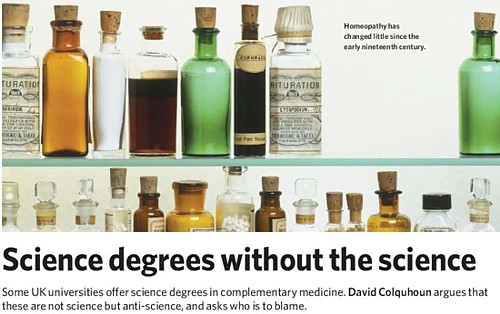
The Nature title picture was ‘Taken from The Complete Guide to Homeopathy, © Dorling Kindersley Ltd’ (not a recommended text book at UCL)
Nature (March 22 2007) ran this commentary, alongside a News item by Jim Giles:
Download a reprint of the article here.
Download the while 2005 westminster University miasmatic exam paper here.
Degrees in homeopathy slated as unscientific
and a Nature podcast [listen to podcast].
Here is some of the coverage of this commentary (more soon, including some of the abuse). A transcript pf the podcast is here.
Interview on the BBC’s Today Programme, with Edward Stourton.
Listen to interview
Material World (BBC Radio 4). This excellent science programme, presented by Quentin Cooper, had a longer version of DC versus David Peters (Westminster University). There was helpful intervention from Michael Marmot who had talked, in the first half of the programme, about his longitudinal population studies. [listen to part 2].
Radio 5 Live interview.
BBC London News (BBC1 TV), An interview of DC and Peter Fisher
by the News Presenter, Riz Lateef. Dr Fisher, who is clinical director of the Royal London Homeopathic Hospital, made a very interesting comment, at the end of a discussion about whether homeopathy was a suitable subject for a science degree.
| Riz Lateef (presenter): “Dr Fisher, could you ever see it [homeopathy] as a science degree in the future? Dr Peter Fisher: “I would hope so. I wouldn’t deny that a lot of scientific research needs to be done, and I would hope that in the future it would have a scientific basis. I have to say that at the moment that basis isn’t comprehensive. To that extent I would agree with Professor Colquhoun.” |
Download the movie (5.9 Mb .wmv file: (quotation is at the end)
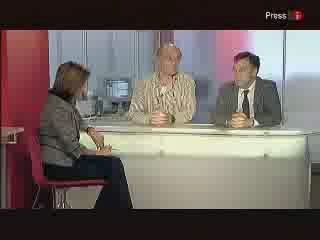 ]
]
A shorter version of the movie, showing only the quotation at the end has appeared on YouTube.
Evidence? During the interview, Peter Fisher said
“. . .if you look in the Cochrane library, . . . you will find that there are two treatments for flu that appear to be effective, and one of them is homeopathic”
I presume this refers to the Cochrane review “Homoeopathic Oscillococcinum for preventing and treating influenza and influenza-like yndromes”. What this actually says is
“Trials do not show that homoeopathic Oscillococcinum can prevent influenza. However, taking homoeopathic Oscillococcinum once you have influenza might shorten the illness, but more research is needed.”
Well, it might, but even if it did, the average length of the putative “shortening” of the illness was a mere 0.28 days, i.e. 6.7 hours. To call that “effective” seems to me to be just a tiny bit of an exaggeration.
The newspapers
“Faith-based degree ‘damages science’ ”
Mark Henderson, Science Editor, The Times. I love that title: it says it all.
Homeopathy science degrees ‘gobbledygook’
Ian Sample, science correspondent, The Guardian.
Alternative medicine degrees ‘anti-scientific’
Roger Highfield, Science Editor, in the Daily Telegraph
Universities ‘are duping students with homeopathy science degrees’
Steve Connor, science correspondent The Independent
Less than complementary? James Morgan in the Glasgow Herald
Alternative therapy degree attack
UK universities are teaching “gobbledygook” following the explosion in science degrees in complementary medicine, a leading expert says. BBC News web site
University homoeopathy degrees ‘gobbledygook’, claims Professor
Fiona McRae in the Daily Mail.
and the story even got into the free London papers, Metro and The London
Paper
And some from abroad
British health expert brands homeopathy ‘gobbledygook’
From ‘our correspondent’ at DailyIndia.com.
Homeopathic Degree in Britain Puts Scientific Gloss on Nonscientific Dross, Critics Say
Susan Brown in The Chronicle of Higher Education (USA)
UK Fight Over Anti-Science in Medicine
Dr Steven Novella comments in the NeuroLogica Blog, part of the New England Skeptical Society site.
Some follow up
A matter of degree. Why the letters after a homoeopath’s name really do count
Mark Henderson, 24th March, in The Times (Body and Soul section)
Ann Robinson, in the Guardian’s Comment is Free (Sunday 25th March) gives me a bit of a slagging off. But her piece is followed by a flood of comments, almost all of them thoroughly sensible. One comment, from ‘Midas’ ends thus.
So why not homeopathy alongside medicine? Right. Why not Levitation alongside Aeronautical Engineering?
And the blogs: quite a lot of blogs picked up the story.
Thanks to everyone who sent letters of support, not least the regular scientists from Westminster, and University of Central Lancashire who are clearly rather embarrassed by their homeopathic colleagues.
Inevitably there were a few bits of hate mail too, each answered politely, and some even resulting in a degree of agreement. The only one worth quoting is a rather mild one from George Lewith (see below).
| “Do you realise that your own university (University College London) offers a BSc in architecture? I have yet to find that this particular course (from personal experience) involves a single piece of science. You might like to investigate at the Bartlett.” . . .”I suggest you make a formal complaint to your Provost, the Dean of the Medical School, and the committee of UK Vice-Chancellors of Medical Schools. You must know that you are completely out of sync but perhaps you don’t? Kind regards George |
I guess one of us is out of sync anyway. Unlike George (it appears), I know little about architecture, but the idea of design for a tower block based on homeopathic principles sounds a bit scary to me.
One year from our first letter to NHS Trusts, we sent another. Listen to the interview by John Humphrys on the Radio 4 Today Programme, with Raymond Tallis and Peter Fisher. :And hear Fisher suggest that he works for UCL (not true). You can also download a summary of the current evidence in the form of an example commissioning document which accompanied our letter.
May 23, 2007. A year ago, our letter to NHS Trusts urged them to stop paying for “unproven and disproved treatments”. A year on, we sent a second letter. Read it here.
On May 23 2007, John Humphrys introduced coverage of this on the Radio 4 Today Programme with the words
“Doctors who think homeopathy is a waste of time and money seem to be winning the argument”
To listen to his interview with Raymond Tallis and Peter Fisher click here. In the interview, Peter Fisher not only misrepresented the evidence, as usual, but also he said
“We are integrating it [homeopathy] within NHS services in University College London which is one of the leading, you know, biomedical centres in the country.”
Hang on a moment! I’m glad that Fisher thinks that UCL is a “leading biomedical centre”, but he does not work for UCL (which is a university), but for the UCLH Trust, which is an NHS Trust. This shameless attempt to use the reputation of a quite different institution to bolster his case smacks of desperation (not to mention mendacity).
After Fisher’s emphasis on “integration”, Tallis commented
“The use of the word integrate is interesting. I mean I suppose you can regard combining medicines that don’t work with medicines that do work as a kind of integrative approach . . “;
The evidence
Our second letter to NHS Trusts said “If you have not already reviewed your own trust’s provision, you might find it useful to consider, in conjunction with your Director of Public Health, the paper that we have enclosed which, while not a full review of the scientific position, has been used by other trusts to promote evidence based commissioning.”. This letter has a summary of the evidence,
Good reports in the newspapers include
“Hard-up NHS trusts cut back on unproven homoeopathy treatment”: Mark Henderson in The Times
“Doctors renew drive to ban NHS homeopathy”: James Randerson, in the Guardian
[This post has been transferred from my old IMPROBABLE SCIENCE page]
Follow-up
Homeopaths have been harping on about our alleged misuse of the NHS logo, ever since this second letter was sent. It is often said that the letter was sent under the NHS letterhead. As so often, they don’t bother to check. There was no NHS logo on the letter. The only place the logo occurred was on the sample template fo commissioners that was sent with the letter. That template has always been available for download from this post. It is very obviously intended to be a template, with sections that are to be completed by commissioners highlighted. There is no way it could be taken to be representing itself as a letter from the NHS. This is how it starts.
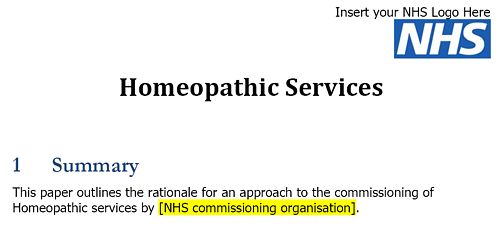
A colleague wrote to his MP to ask if anything could be done about the defrauding of the public by “psychic surgeons”. He wrote, in particular, about Stephen Turoff.
Turoff was the subject of the first episode of “Trust me I’m a Healer”, a programme that looked at “fake psychic healers”. They are the BBC’s own words (see badpsychics.com).
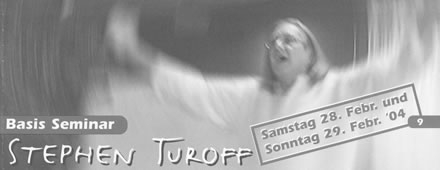
Psychic surgery is nothing but a total hoax.
Psychic surgery was discredited by the U.S. Federal Trade Commission in 1975. In a unanimous opinion, the commission declared that “‘psychic surgery’ is nothing but a total hoax.” Judge Daniel H. Hanscom, in granting the FTC an injunction against travel agencies promoting psychic surgery tours, said: “Psychic surgery is pure and unmitigated fakery. The ‘surgical operations’ of psychic surgeons … with their bare hands are simply phony.” (see here)
Eventually my colleague got an answer from Lord Hunt, junior minister at the Department of Health (generally loyal Blairite, but he did resign over Iraq).
The response makes one wonder what planet the minister is living on Psychic fraud a “profession”? And capable of self-regulation? This letter is just surreal.
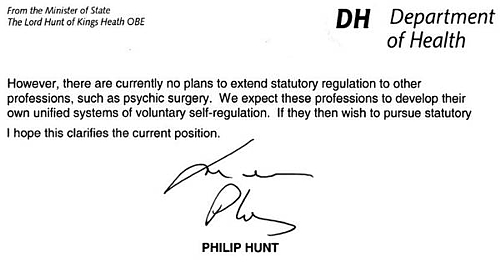
Clearly misunderstanding the nature of science is not restricted to any political party. In any case, regulation of crackpot medicine arguably does more harm than good (see Letter to the Times).
Most sorts of crackpot medicine are desperate to be “regulated” by the government. They know that the regulation is ineffective, and they know that it gives them a stamp of government approval with few obligations on their part. They can then claim to be “professional” psychic surgeons
(or whatever) and pretend to be proper doctors. And foremost among those pressing for this sort of phony respectability has been the Prince of Wales Foundation for Integrated Health (see here and here).
